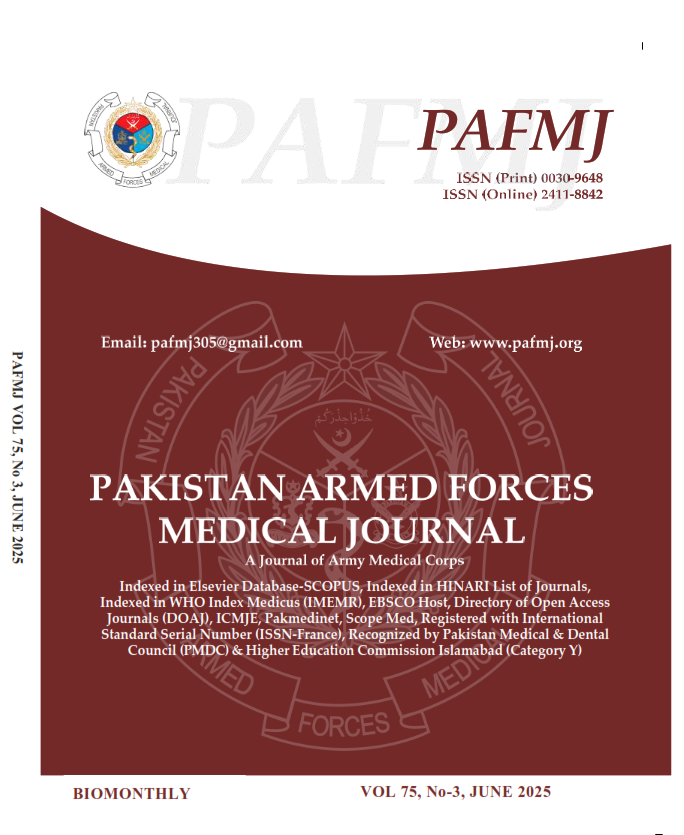Pattern of Common Bile Duct Injuries in Laparoscopic versus Open Cholecystectomy
DOI:
https://doi.org/10.51253/pafmj.v75i3.10608Keywords:
CBD Injury, Laparoscopic cholecystectomy, Open cholecystectomy.Abstract
Objective: To determine the frequency of various patterns of injury to the common bile duct during laparoscopic versus open cholecystectomy.
Study Design: Prospective longitudinal study.
Place and Duration of Study: Pak Emirates Military Hospital, Rawalpindi Pakistan, from Sep 2023 to Mar 2024.
Methodology: A total of 98 patients fulfilling the inclusion criteria were included in the study. All the patients underwent cholecystectomy either by laparoscopic or open procedure, and the procedure performed was also documented. Any case of injury to the CBD was documented, and its pattern, based on the Strasberg Classification, was assessed and documented.
Results: Mean age was 45.23±6.85 years. 35(35.70%) were male, while 63(64.30%) were female. The mean body mass index was 32.50±2.85 kg/m2. The mean duration since diagnosis of gallstones was 7.45±1.18 months. 69(70.40%) had laparoscopic cholecystectomy, while 29(29.60%) had open cholecystectomy. The composite frequency of iatrogenic injury to the common bile duct (CBDI) was 7(7.10%). CBD injury occurred in 4(5.79%) in laparoscopic cholecystectomy, while in open cholecystectomy, it occurred in 3(10.34%), (p=0.425). In the laparoscopy Group, 2(2.89%) had Strasberg Class A injuries, and 2(2.89%) had Strasberg Class D injuries. In contrast, in the open procedure Group, 2(6.89%) had Strasberg Class D injuries, and 1(3.44%) had a Strasberg Class E injury.
Conclusion: The CBD injury rate is lower with the laparoscopic approach of gallbladder removal and is associated with lesser severity of injury.
Downloads
References
Brunt LM, Deziel DJ, Telem DA, Strasberg SM, Aggarwal R, Asbun H, et al.; and the Prevention of Bile Duct Injury Consensus Work Group. Safe cholecystectomy multi-society practice guideline and state of the art consensus conference on prevention of bile duct injury during cholecystectomy. Ann Surg 2020; 272(1): 3-23.
https://doi.org/10.1097/SLA.0000000000003791
Dai HS, Liang L, Zhang CC, Cheng ZJ, Peng YH, Zhang YM, et al. Impact of iatrogenic biliary injury during laparoscopic cholecystectomy on surgeon's mental distress: a nationwide survey from China. HPB (Oxford) 2020; 22(12): 1722-1731.
https://doi.org/10.1016/j.hpb.2020.03.019
Schreuder AM, Busch OR, Besselink MG, Ignatavicius P, Gulbinas A, Barauskas G, et al. Long-term impact of iatrogenic bile duct injury. Dig Surg 2020; 37(1): 10-21.
https://doi.org/10.1159/000496432
Pesce A, Palmucci S, La Greca G, Puleo S. Iatrogenic bile duct injury: impact and management challenges. Clin Exp Gastroenterol 2019; 12: 121-128.
https://doi.org/10.2147/CEG.S169492
Wakabayashi G, Iwashita Y, Hibi T, Takada T, Strasberg SM, Asbun HJ, et al. Tokyo Guidelines 2018: surgical management of acute cholecystitis: safe steps in laparoscopic cholecystectomy for acute cholecystitis (with videos). J Hepatobiliary Pancreat Sci 2018; 25(1): 73-86.
https://doi.org/10.1002/jhbp.517
Christou N, Roux-David A, Naumann DN, Bouvier S, Rivaille T, Derbal S, et al. Bile duct injury during cholecystectomy: necessity to learn how to do and interpret intraoperative cholangiography. Front Med 2021; 8: 637987. https://doi.org/10.3389/fmed.2021.637987
Mou D, Tesfasilassie T, Hirji S, Ashley SW. Advances in the management of acute cholecystitis. Ann Gastroenterol Surg 2019; 3(3): 247-253. https://doi.org/10.1002/ags3.12240
Karanikas M, Bozali F, Vamvakerou V, Markou M, Memet Chasan ZT, Efraimidou E, et al. Biliary tract injuries after lap cholecystectomy—types, surgical intervention and timing. Ann Transl Med 2016; 4(9): 163.
https://doi.org/10.21037/atm.2016.05.07
Yang S, Hu S, Gu X, Zhang X. Analysis of risk factors for bile duct injury in laparoscopic cholecystectomy in China: A systematic review and meta-analysis. Medicine 2022; 101(37): e30365.
https://doi.org/10.1097/MD.0000000000030365
De'angelis N, Catena F, Memeo R, Coccolini F, Martínez-Pérez A, Romeo OM, et al. 2020 WSES guidelines for the detection and management of bile duct injury during cholecystectomy. World J Emerg Surg 2021; 16(1): 30.
https://doi.org/10.1186/s13017-021-00369-w
Tagar MP, Jamali KS, Abbasi MR, Tagar S. Bile duct injuries; determine the frequency during open and laparoscopic cholecystectomy at tertiary care hospitals. Professional Med J 2017; 24(1): 64-68.
https://doi.org/10.17957/TPMJ/17.3555
Charan J, Biswas T. How to calculate sample size for different study designs in medical research? Indian J Psychol Med 2013; 35(2): 121-126.
https://doi.org/10.4103/0253-7176.116232
Halle-Smith JM, Hodson J, Stevens LG, Dasari B, Marudanayagam R, Perera T, et al. A comprehensive evaluation of the long-term clinical and economic impact of minor bile duct injury. Surgery 2020; 167(6): 942-949.
https://doi.org/10.1016/j.surg.2020.01.022
Strasberg SM, Hertl M, Soper NJ. An analysis of the problem of biliary injury during laparoscopic cholecystectomy. J Am Coll Surg 1995; 180(1): 101-125.
Arif M, Alam A, Shoaib M, Anjum S. Is Open Cholecystectomy still an essential procedure in the era of minimally invasive surgery? A prospective analysis of patients presenting with gallstone disease at a community hospital. Pak J Med Health Sci 2019; 13(1): 134-137.
Kohn JF, Trenk A, Kuchta K, Lapin B, Denham W, Linn JG, et al. Characterization of common bile duct injury after laparoscopic cholecystectomy in a high-volume hospital system. Surg Endosc 2018; 32(3): 1184-1191.
https://doi.org/10.1007/s00464-017-5790-8
Patel AM, Yeola M, Mahakalkar C. Demographic and risk factor profile in patients of gallstone disease in central India. Cureus 2022; 14(5): e24993.
https://doi.org/10.7759/cureus.24993
Song ST, Shi J, Wang XH, Guo YB, Hu PF, Zhu F, et al. Prevalence and risk factors for gallstone disease: A population-based cross-sectional study. J Dig Dis 2020; 21(4): 237-245. https://doi.org/10.1111/1751-2980.12857
Pesce A, Portale TR, Minutolo V, Scilletta R, Li Destri G, Puleo S, et al. Bile duct injury during laparoscopic cholecystectomy without intraoperative cholangiography: a retrospective study on 1,100 selected patients. Dig Surg 2012; 29(4): 310-314. https://doi.org/10.1159/000341660
Faridoon S, Hadi A, Shah FO, Afridi NG, Muhammad S, Yousaf M et al. Iatrogenic bile duct injury following open and laparoscopic cholecystectomy and treatment outcome. J Surg Pakistan 2018; 23(1): 21-24.
https://doi.org/10.21699/jsp.23.1.6
Mostafa ESA, Mostafa EM, Elbadawy HA, Abd-el-aal Mohamed M. Bile duct injuries during open and laparoscopic cholecystectomy. Med J Cairo Univ 2020; 88(2): 756-774.
Downloads
Published
Issue
Section
License
Copyright (c) 2025 Muhammad Raza, Muhammad Qasim Butt, Sohaib Ashraf, Muhammad Ali Zain, Faizan Haider, Muhammad Waqas Ahmed Bhatti

This work is licensed under a Creative Commons Attribution-NonCommercial 4.0 International License.















